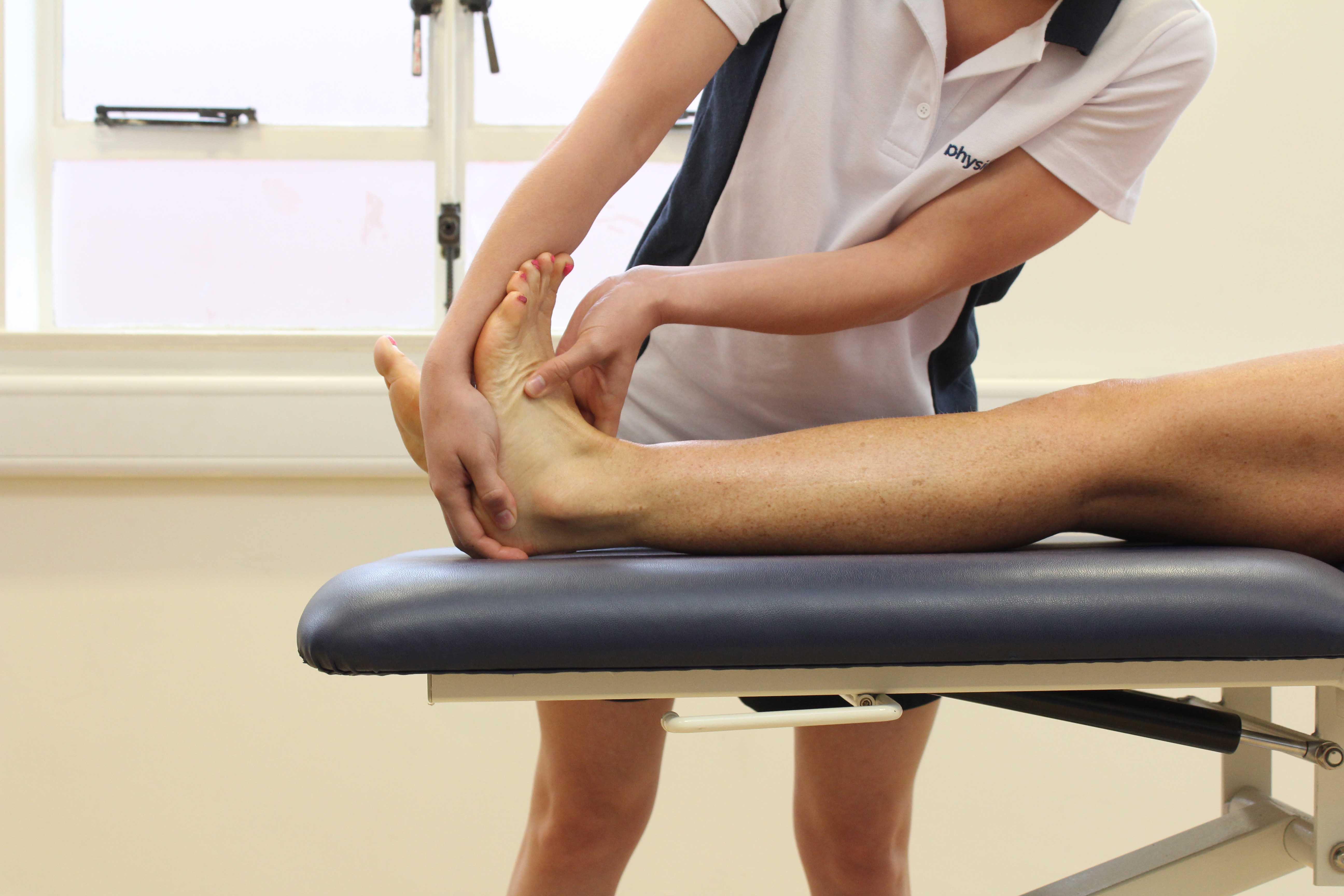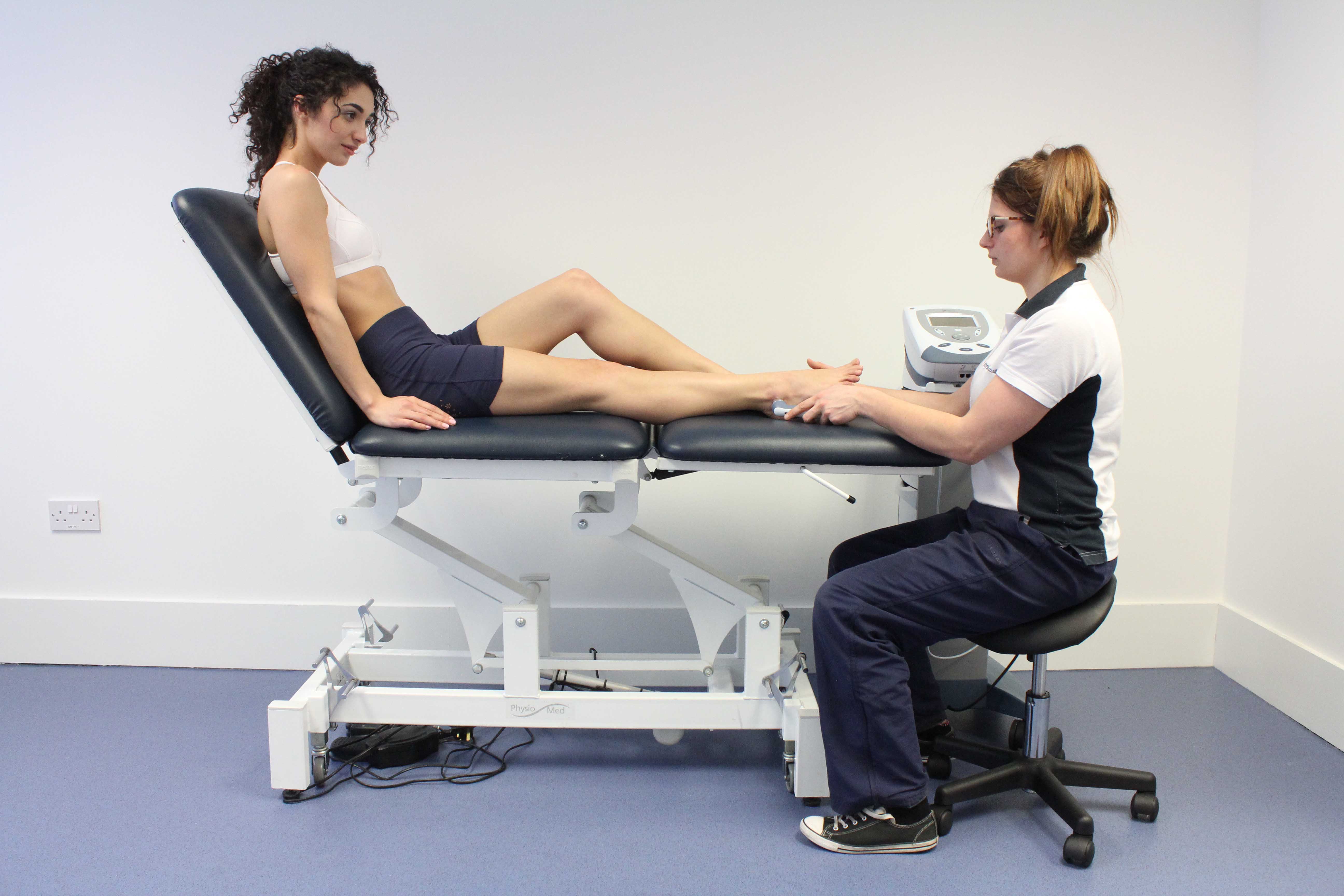What is medial plantar neuropraxia?
Medial plantar neuropraxia is chronic (long term) compression of the medial plantar nerve, causing heel pain.
The medial plantar nerve runs through the ankle and along the inside of the foot. Neuropraxia is compression or entrapment of a nerve. When the medial plantar nerve is compressed or entrapped it causes heel pain and this is known as medial plantar neuropraxia.
Medial plantar neuropraxia may also be known as jogger’s foot.
 Above: Passive stretch of the achilles tendon performed by specialist therapist
Above: Passive stretch of the achilles tendon performed by specialist therapistHow does medial plantar neuropraxia happen?
A muscle called the abductor hallucis muscle runs alongside the medial plantar nerve. When there is repetitive impact to the abductor halluces muscle, such as during long distance running, the muscle can become swollen and inflamed. This then presses against the medial plantar nerve and causes the nerve to be compressed or entrapped. This is what causes the pain.
Having flat feet can also cause the problem as there is no arch on the inside of the foot, the impact of running is felt on the inside of the foot which can cause the abductor hallucis muscle to become inflamed and therefore affect the medial plantar nerve.
What are the symptoms of medial plantar neuropraxia?
Symptoms of medial plantar neuropraxia will have a gradual onset and may include:
- Burning heel pain
- Aching and tenderness on the inside of the foot
- Altered sensation on the bottom of the foot behind the big toe
- Feeling of ‘giving-way’ when running
What should I do if I have medial plantar neuropraxia?
If you have or suspect you have medial plantar neuropraxia, you should consult a physiotherapist as they will be able to reduce the pain and prevent re-occurrence in the future. In the meantime it is best to rest the foot to allow the inflammation to reduce and healing to take place. You can also apply ice to the inside of your foot using a bag of frozen peas or crushed ice wrapped in a damp cloth for 15–20 minutes over the inside of your foot every 1–2 hours.
 Above: Ultrsound therapy applied to ankle injury by specialist physiotherapist
Above: Ultrsound therapy applied to ankle injury by specialist physiotherapistWhat shouldn’t I do if I have medial plantar neuropraxia?
If you have or suspect you have medial plantar neuropraxia, you should not ignore the problem and continue to run. This may lead to your problem getting worse and your pain becoming more severe and more frequent.
Physiotherapy treatment for medial plantar neuropraxia.
Physiotherapy treatment can help to relieve symptoms and prevent the problem re-occurring in the future. Treatment may involve:
- Gait (walking) re-education for both walking and running
- Provision of orthotics (insoles)
- Possible cortisone injection
- Education for footwear and exercise technique
Could there be any long-term effects from medial plantar neuropraxia?
Most people with medial plantar neuropraxia improve with treatment and, if they follow the physiotherapy advice, will not suffer a re-occurrence. If medial plantar neuropraxia does not respond to treatment then surgery may be required. Surgery would involve releasing the navicular ligament to create more space for the medial plantar nerve. This relieves the compression on the medial plantar nerve which relieves symptoms.
Please call Physio.co.uk on 0330 088 7800 to arrange an appointment or book online today.

 0330 088 7800
0330 088 7800





































